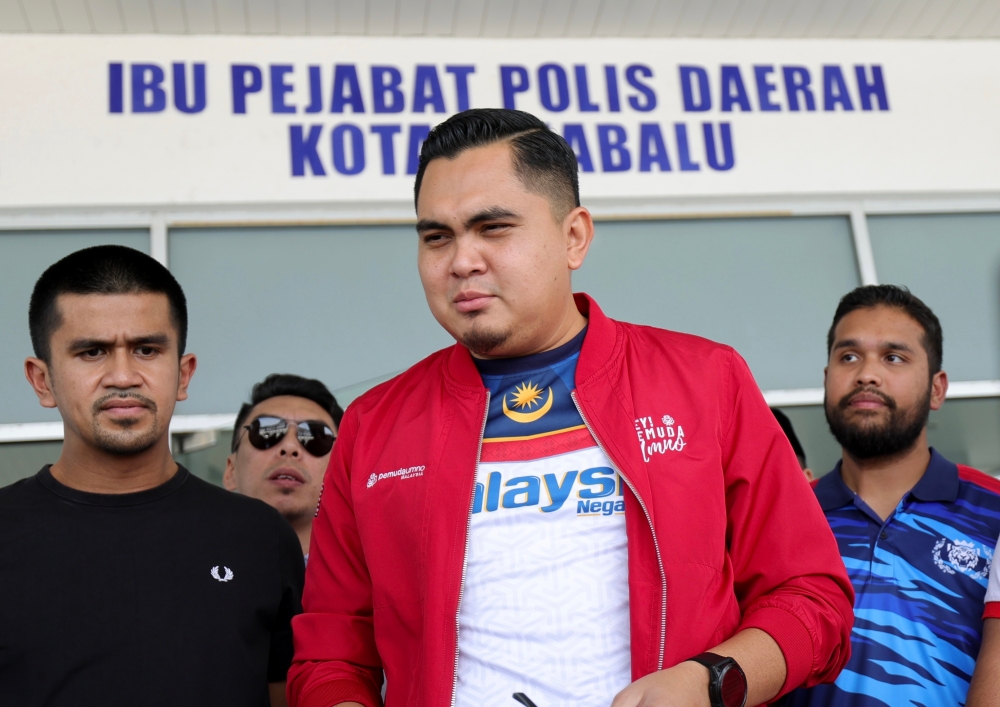APRIL 8 — Umno Youth chief Muhamad Akmal Saleh claimed that he was arrested in Kota Kinabalu on Friday (April 5).
In a Facebook post, he said he was arrested at Kota Kinabalu police headquarters despite being scheduled to give his statement at the Dang Wangi police headquarters in Kuala Lumpur on Saturday (April 6).
“Insya Allah, I will give my full cooperation,” said Akmal.
In the meantime, Inspector-General of Police Razarudin Husain confirmed receiving two reports on Akmal’s statements on the “Allah” socks issue, and that the case was being investigated under Section 4(1) of the Sedition Act 1948 and Section 233 of the Communications and Multimedia Act 1998 for misuse of network facilities.
Let’s take a quick look at the case of Lee Cher Joo @ Lee Sujan & Anor v Mohd Sharif bin Othman & Ors [2009], where the plaintiffs claimed to have been wrongly arrested and detained by the police at Balai Polis Buloh Kasap from 6.30pm till 9.00 on June 30, 2005. The first plaintiff said that he went to Balai Polis Buloh Kasap with his son, the second plaintiff, at about 6.30pm in response to the police’s requests for them to come over.
The police had received a report lodged by a complainant where the complainant alleged that earlier in the day he was chased by both the plaintiffs armed with parangs while he was tapping rubber on his plot of rubber land.
At the Balai, the plaintiffs were asked to wait till 9.00pm. At about 9.00pm, several policemen from Balai Polis Segamat arrived and took the plaintiffs to Balai Polis Segamat. No reason was given why both of them were taken to Balai Polis Segamat.
The plaintiffs claimed that they were arrested by “implication of law” at 6.30pm when they were at Balai Polis Buloh Kasap before being taken to Balai Polis Segamat.
Is there such a thing as arrest by implication of law?
Whether a person is under arrest or not is a question of fact to be decided upon the circumstances of each case. Judge of Court Appeal Gopal Sri Ram, in Lim Hock Boon v Public Prosecutor [2007] said as follows:
“Whether a person is under arrest is an issue of inferential fact. In other words, it is a fact that is to be reasonably inferred from proved or admitted facts. No better passage than that from the judgment of Shanker J in Public Prosecutor v Kang Ho Soh [1992] is needed to bring home the point: ‘whether in a particular case a person was under actual arrest at a given moment in time is a question of fact to be decided according to the circumstances of each case’.”
In Lee Cher Joo, on the facts and evidence before him, the learned Judicial Commissioner Ahmadi Asnawi (as he then was) said:
“In their own words, [the plaintiffs] were only told to wait till 9.00 pm. In my view this does not amount to an arrest, for if they were in fact already arrested by then, there is no necessity for the officers to tell them to wait till 9.00 pm. [The police] have all the time in the world, albeit, 24 hours, to deal with both the plaintiffs after making the arrests if at all they were already under arrest as soon as they arrived at the Balai.
“The fact that they were told by the police to wait till 9.00pm merely goes to show that there were no arrests during the times the plaintiffs were at the Balai. There is a world of difference between telling the person to wait and arresting the person.
“The willingness to wait or obliging the officer is equally not a submission to the [custody of the police] on account that at the material time the plaintiffs were at liberty either to agree/comply or leave the Balai. The willingness to wait or agreeing to wait is not equivalent to being put under arrest.”

On the facts before the court, the learned judicial commissioner found that both the plaintiffs were not under any form of arrest during the times they were present at Balai Polis Buloh Kasap from 6.30pm to 9.30pm.
The facts and circumstances of the case did not warrant the inference of an arrest.
So, was Akmal arrested or was he obliging the police in their investigation pursuant to the police reports?
Arrest is a question of fact.
SELAMAT HARI RAYA. MAAF ZAHIR DAN BATIN
*This is the personal opinion of the writer or publication and does not necessarily represent the views of Malay Mail.





















